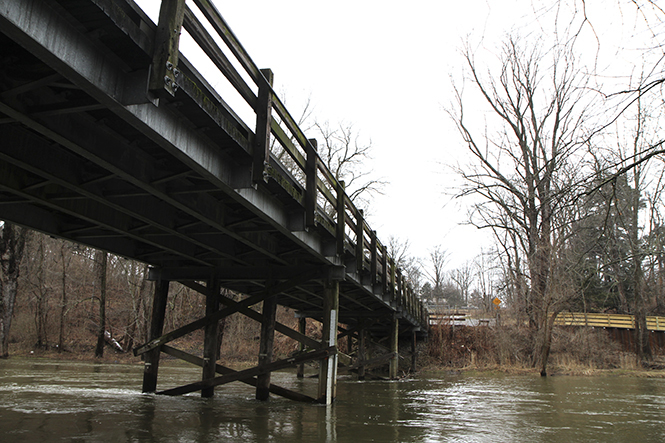Mollusk problem a hard one to crack for Kent bridge reconstruction
The replacement of the Harvey Redmond Bridge, connecting Fred Fuller Park and Kramer Ball Fields, was delayed after the discovery of endangered mussels living under the bridge in December. Photo by Shane Flanigan.
It could be another year before the Harvey Redmond Bridge, linking Kramer Ball Fields to Fred Fuller Park, gets a replacement, said John Idone, director of Kent Parks and Recreation.
On Aug. 20, 2011, an ODOT surveyor discovered an endangered species of mussels living beneath the bridge, said Rhonda Boyd, Kent City Engineer.
“They discovered one live individual and one dead shell of an Eastern pondmussel, and they found several other species of pondmussels as well,” Boyd said. “Because they did find a state endangered living mussel, we are now required as part of our mitigation plan to go in and relocate these mussels.”
First slated for removal in 2009, the bridge has caused a series of problems for Kent in the process of replacing the bridge. Idone said the first application by Parks and Recreation to ODOT’s Municipal Bridge Program was denied due to the number of other bridges in need of repair. In 2010, ODOT approved a second application.
“They rank it by a whole variety of factors, and they have limited funding, so they kind of rank you in order [of need],” Idone said. “You kind of work your way down the list and, as other projects get funded, then your project moves up.”
Acceptance to this program means that $968,000 — 80 percent of the total $1.166 million cost of replacing the bridge — is paid by the federal government. Idone said Kent Parks and Recreation will pay the remaining 20 percent as well as $130,000 worth of design costs for the bridge. Two federal grants totaling $90,000 will help cover part of those design costs, while the Parks and Recreation capital improvements budget — collected through property taxes — funds the remainder.
Boyd said the detailed application process for federal funds extended the timeframe for the bridge replacement.
“The money really isn’t available to be spent until June of this year,” Boyd said. “It was programmed for that and unfortunately, the structure just didn’t make it long enough.”
With the federal application process nearing completion, relocating the mussels has created another unforeseen setback in the process, Boyd said. The mussels must stay where they are until the water temperature in the Cuyahoga reaches 60 degrees, which will likely be in late June or July.
“We’re required to hire a certified malacologist [scientist who specializes in mollusks] who is registered with the Ohio Department of Natural Resources and U.S. Fish and Wildlife,” Boyd said, “so that person will be responsible to oversee the moving of the mussels, and they will identify a bed that’s suitable to put [the mussels] in.”
Brian Peck, ODOT District 4 environmental specialist, said three known mussel beds live under the bridge, but the exact number of individual mussels is unclear.
“[The malacologists will] actually hand-remove the mussels. They’ll inventory the mussels, and then move them upstream to a new bed, far enough away that there’s no sedimentation impact to the mussels,” Peck said. “For this particular project, the water is relatively shallow, so it should not be a long or difficult relocation.”
Boyd said the process of relocating the mussels could cost an estimated $5,500, which will be included in the existing grant.
“The mussel relocation takes two passes, so even after they move them, they have to come back again in seven days,” Boyd said. “You have to come back and scan the area again to make sure that you got them all.”
Construction of the new bridge is tentatively scheduled for August, Boyd said. Lacking any additional delays, the bridge will be completed in time for baseball season in April 2014. Kramer Ball Fields has been inaccessible since the bridge closed in April 2011 for safety reasons.
“We’re trying the best we can to get it open,” Boyd said. “I know there’s a lot of people who are anxious to get over on the ball field, but it has to go through due process.”
Contact Amy Cooknick at [email protected].



